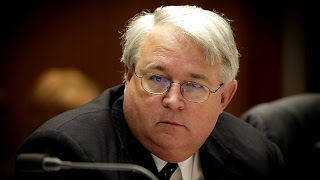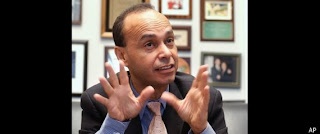by David Bacon
Oakland, California - When Occupy Seattle called its tent camp "Planton Seattle," camp organizers were laying a local claim to a set of tactics used for decades by social movements in Mexico, Central America and the Philippines. And when immigrant janitors marched down to the detention center in San Diego and called their effort Occupy ICE (the initials of the Immigration and Custom Enforcement agency responsible for mass deportations),people from countries with that planton encampment tradition were connecting it to the Occupy movement here.
This shared culture and history offer new possibilities to the Occupy movement for survival and growth at a time when the federal law enforcement establishment, in cooperation with local police departments and municipal governments, has uprooted many tent encampments. Different Occupy groups from Wall Street to San Francisco have begun to explore their relationship with immigrant social movements in the US, and to look more closely at the actions of the 1 percent beyond our borders that produces much of the pressure for migration.
Reacting to the recent evictions, the Coalition for the Political Rights of Mexicans Abroad recently sent a support letter to Occupy Wall Street (OWS) and the other camps under attack. "We greet your movement," it declared, "because your struggle against the suppression of human rights and against social and economic injustice has been a fundamental part of our struggle, that of the Mexican people who cross borders, and the millions of Mexican migrants who live in the United States."
Many of those migrants living in the US know the tradition of the planton and how it's used at home. And they know that the 1 percent, whose power is being challenged on Wall Street, also designed the policies that are the very reason why immigrants are living in the US to begin with. Mike Garcia, president of United Service Workers West/SEIU, the union that organized Occupy ICE, described immigrant janitors as "displaced workers of the new global economic order, an order led by the West and the United States in particular."
Criminalizing the act of camping out in a public space is intended, at least in part, to keep a planton tradition from acquiring the same legitimacy in the US that it has in other countries. That right to a planton was not freely conceded by the rulers of Mexico, El Salvador or the Philippines, however - no more than it has been conceded here. The 99 percent of those countries had to fight for it.
Two of the biggest battles of modern Mexican political history were fought in the Tlatelolco Plaza, where hundreds of students were gunned down in 1968, and three years later in Mexico City streets where more were beaten and shot by the paramilitary Halcones. In both El Salvador and the Philippines, strikers have a tradition of living at the gates of the factory or enterprise where they work. But even today, that right must be defended against the police, and (at least until the recent election of the Funes and Aquino governments) even the military.
Plantons or encampments don't stand alone. They are tactics used by unions, students, farmers, indigenous organizations, and other social movements. Each planton is a visible piece of a movement or organization - a much larger base. When the plantons are useful to those movements, they defend them. That connection between planton and movement, between the encampment and its social base, is as important as holding the physical space on which the tents are erected.
Leobardo Benitez Alvarez. a fired SME member, in the union's planton. (Photo: David Bacon)
For the last two years, that relationship has been very clear in the Zocalo, Mexico City's huge central plaza. During that time, fired members of Mexico's independent left-wing electrical workers union, the SME, have lived in a succession of plantons. They've often been elaborate, with kitchens, meeting rooms and communications centers, in addition to the tents where people slept and ate.
At various time, the SME encampment was one of several in the huge square. A year ago, the workers were joined by indigenous Triqui and Mixtec women from Oaxaca, who protested the violence used by their state's previous governor against teachers' strikes and rural organizations. The social movement in Oaxaca, which the women represented in Mexico City, grew strong enough to finally knock the old ruling party, the PRI, from the governorship it had held for almost 80 years.
In the Zocalo plantons, people from different organizations mix it up. Last September's Day of the Indignant brought together people from very diverse movements. Some see electoral politics as a vehicle for change, but many indigenous activists and SME members don't. Even among those who do, there are deep disagreements over how to participate in the electoral process.
But the people in the Zocalo have two things in common. Different plantons may not see every political question eye to eye, but each represents a social movement in the world outside the plaza. And the planton itself has value primarily because it forces public attention to focus on the crisis that has led each group to set up its encampment.
The SME workers used their plantons to dramatize repression by the federal government. When Mexican President Felipe Calderon dissolved the state-run power company for central Mexico and fired its 44,000 employees, he sought to destroy their union and move toward the privatization of the electrical system - to benefit Mexican and foreign 1 percenters. A year ago, several SME members conducted a hunger strike at the planton that generated front-page headlines for weeks, and lasted so long that doctors warned participants they were risking death. At the height of the protest, the union battled police in front of the power stations, as it tried to exercise its legal right to strike and picket.
The planton and the movement outside it were intimately connected. The hunger strikers were few, but spoke for a union of tens of thousands of workers. In the end, the SME negotiated the removal of its last planton in return for government acknowledgement of its right to exist. It organized other unions to resist the government's assault on labor rights, and mobilized electricity consumers to protest rising bills and cuts in service. The planton helped to focus attention on these demands, and to pull the union's allies into action.
Clearly, someone in Seattle knows this tradition of plantons in the Zocalo, perhaps even as a participant. When the painter made the Seattle banner, she or he also included, right next to the word "planton," the anarchists' "A" with the circle around it. This symbol was a reminder of another aspect of cross-border fertilization. Many anarchists or anarcho-syndicalists - members of the Industrial Workers of the World - fought in the Mexican Revolution. Because of that revolutionary upheaval, even today, almost a century later, ordinary Mexicans expect certain rights, including the right to set up a tent in the Zocalo. US workers crossed the border to fight alongside Mexicans in that insurrection long ago, for a government that would acknowledge that right. The planton, therefore, is a common heritage, with a history that makes it as legitimate on Wall Street as it is in Mexico City.
Not long after the OWS camp was set up in Zuccotti Park, the planton/occupy movement crossed the US/Mexico border. In Tijuana, home to a million people, mostly displaced migrants from Mexico's south, activists came together and set up an occupation on the grassy median of the Paseo de los Heroes. Their tents were pitched in the middle of the Zona del Rio, where the city's 1 percent meet in fancy hotels and work in government offices. Then, on October 18, police reacted even earlier than they did in most US cities, arresting two dozen activists at the urging of local businessmen. Occupy Tijuana condemned the detentions, declaring, "We are not assassins, delinquents, tramps or crooks."
In the US, we have our own history of defending public space for protest, and it isn't necessary to reach back a 100 years to find it. In just the last few decades, immigrant workers have popularized the use of the planton here, helping unions recover the militant tactics of their own past. In 1992, immigrants trying to join the United Electrical Workers mounted the first strike among production workers in Silicon Valley, and set up a planton and conducted a hunger strike to pressure their employer. A year later, other Latino immigrants in San Francisco erected their tents on the sidewalk in front of Sprint's headquarters, after their workplace was closed days before they were scheduled to vote in a union election.
A decade ago, anti-globalization activists and unions shut down the meeting of the World Trade Organization in Seattle. Young protesters chained their arms together inside metal pipes, and lay down in the intersections of downtown Seattle. Tens of thousands took over the streets. Other anti-globalization protests followed, in which activists battled for their right to use public space to challenge the international policies of the 1 percent.
Working-class support for the battle in Seattle had its roots in the impact of the North American Free Trade Agreement (NAFTA). Workers could see the cost of free trade in the loss of their own jobs, as production moved south. Over the last two decades, many have also discovered that those same agreements and policies didn't make Mexicans better off, but led to their impoverishment as well.
NAFTA and free-market policies forced on developing countries produced opportunities for banks and corporations to reap profits. They drove down wages, forced farmers off their land and destroyed the unions and livelihood of millions of people. This system was designed on Wall Street, by the same bankers Occupiers hold responsible for the current crisis of foreclosures and unemployment in the US. The current economic crisis doesn't stop at the border. In fact, in Mexico, Central America, the Philippines, and elsewhere, it's been a fact of life for a long time. This is the source of forced migration - what Garcia condemned at Occupy ICE.
The 99 percent live in all those countries where free-trade agreements and structural adjustment policies are imposed. They also live in the communities of people who have come here as a result. Who, then, are more natural allies for Occupy protesters than people who've been on the receiving end of these policies for years?
In New York, this connection wasn't lost on Occupy Wall Street. In October, a group called Occupy Wall Street - Español was formed at the first Asemblea en Español. They, in turn, translated the first issue of the Occupied Wall Street Journal. Participants formed a subgroup, Occupy Wall Street Latinoamericano to spread the movement to Spanish-speaking communities, recognizing that the city is home to so many Mexicans from the state of Puebla that its nickname is PueblaYork, as well as much older established communities of Puerto Ricans, Colombians, Ecuadorians, and other Spanish-speaking people. The group will soon publish the first issue of its own newspaper, with articles talking about immigration, globalization, and the specific attacks by the 1 percent on Latinos.
Claudia Villegas, a women's rights activist working with the group Occupy Wall Street Latinoamericano, helped organize a demonstration of immigrant women four days after police raided the Zuccotti Park encampment. "We decided to change our original plan for a march because we were afraid they would stop it," she says. "Nevertheless, 23 organizations participated including women's rights groups and above all, those working with immigrant women."
In San Francisco, a joint march of immigrant activists and Occupy participants helped to defend that city's encampment. In the general assembly meeting preceding it, participants talked about the city's offer to move the Occupiers into an abandoned building in the Latino Mission District several miles away. Few wanted to give up the camp on Justin Herman Plaza, and most felt the city was just trying to move them out of sight. But many people also felt that having an Occupy camp in the barrio was a good idea.
"We're still really working in parallel," Villegas says. She draws attention to the potential power of the immigrant rights movement, and what it could mean to OWS. "We have to include the movement that began in 2006, when there were hundreds of thousands of people in the streets across this country. People were reacting to the injustice of the system then too." They're separate movements, though, she warns, and "our agenda has to come from immigrants themselves. We need to integrate, and at the same time the Occupy movement has to learn to accept us. But we're all on the same path."
Bringing the immigrant and Occupy movements together means more than setting up an encampment. The San Diego demonstration didn't set up an overnight camp, but it brought thousands of workers and supporters down to the ICE detention center to protest the firings of immigrant janitors.
The Occupy ICE protest was intended to draw public attention to the federal government's immigration enforcement strategy that requires employers to fire undocumented workers. In Southern California, the multinational corporations that clean office buildings are terminating 2,000 union members. Earlier waves of firings have targeted unionized building cleaners in Minneapolis, Seattle and San Francisco; sewing machine operators in Los Angeles; food service workers on university campuses; and thousands of others.
Garcia says ICE and the employers are in collusion. After firing union janitors with high seniority and benefits, using immigration status as a pretext, the companies can then hire new workers at lower wages with fewer benefits.
"To hide their greed the commercial real estate industry has used the tools of government to confuse and divide the 99 percent," he charges. "They first said we were unskilled workers who should be happy to be working. They then weakened worker protections to make organizing virtually impossible. Over the last decade the industry has used immigration as a wedge to intimidate and, if need be, replace our workers. ICE is doing what the 1 percent corporate real estate industry wants: using immigration laws to recycle well paid janitors in the hopes of taking back gains in pay and benefits our union has won." (Ironically the week United Service Workers West organized Occupy ICE its parent union, SEIU, endorsed the re-election of President Obama, who is responsible for the ICE policy of firing workers.)
For Occupy, defending workers under attack is a way to survive, grow roots and develop a strong base. That's not always the direction activists take, however. Near Oakland, over 200 immigrant workers at the largest foundry on the West Coast, Pacific Steel Casting in Berkeley, are being fired in another "silent raid" like that hitting the janitors. Through the summer and fall, foundry workers went to city councils, unions, churches and community organizations, seeking help to pressure ICE not to force them from their jobs. Their campaign held "the migra" off for months, but the firings began nevertheless in November. Now, these immigrant families are trying to survive. Occupy Oakland has yet to respond, however.
Instead, some of its activists are trying to shut down work in Oakland's port a second time, as well as others along the West Coast. An earlier march to close the port after the first eviction of Occupy Oakland drew thousands of people. The proposal for a second coast-wide shutdown, however, is opposed by the longshore union. The International Longshore and Warehouse Union's (ILWU) opposition does not come from conservatism. The union, whose members make a living from international shipping and trade, has been one of the most vocal critics of US free-trade agreements. ILWU members have taken action many times to defend the SME and unions in Mexico, as well as other countries. Its locals and members, however, had no role in the decision to try to close the ports, nor did other port workers.
Real solidarity is a two-way street, based on mutual respect. In most cities, including Oakland and San Francisco, labor has welcomed Occupy and sought to defend the encampments. In New York, Occupy activists have been given resources in many union halls, and unions have mobilized against police raids at Zuccotti Park. An alliance of unions, immigrants and Occupiers has great potential strength, not just in numbers, but also in the exchange of ideas and tactics. Unions in particular might benefit from wider use of the planton or Occupy encampment. Occupy ICE challenges the Occupy movement to take up the firings of immigrant workers, but it's also a challenge to unions themselves, many of whom have watched in silence as longtime members were forced from their jobs.
The vision of Occupy - the 99 percent vs. the 1 percent - has enormous support among immigrants and unions. In place of the tired rhetoric of politicians, shedding crocodile tears for the "middle class" while demonizing the poor, Occupy gives workers a vision of their commonality in the 99 percent. This powerful message blows away illusions that higher-paid workers have more in common with stockbrokers than with immigrants laboring at minimum wage, or unemployed young people on the streets of African-American ghettos or Latino barrios.
The Coalition for the Political Rights of Mexicans Abroad shares the same vision of class-based commonality. "We are outraged," it says, "that US citizens, when they demand justice and expose the inequalities that exist in their society, are treated like criminals. With the same outrage, we condemn the criminalization of migrant Mexicans by the US government, the raids by immigration authorities [and] the militarization of the border ... No human being should be treated as a criminal because they struggle to find better conditions in which to live."







 1:30 AM
1:30 AM





















